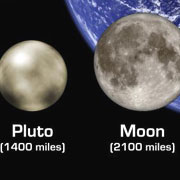Pluto Under Fire
 This week Prague hosts the International Astronomy Union's 26th General Assembly. The organization was founded in 1919 and its mission is "to promote and safeguard the science of astronomy in all its aspects through international cooperation."
This week Prague hosts the International Astronomy Union's 26th General Assembly. The organization was founded in 1919 and its mission is "to promote and safeguard the science of astronomy in all its aspects through international cooperation."
The hot topic revolves (no pun intended) around Pluto. Sure it's smaller than the moon, but what's really drawn attention to the issue is Xena. Xena was discovered as a large chunk of rock near Pluto. In fact, it is 70 miles wider than Pluto. So is Xena a planet too?
Believe it or not, this esteemed group of professionals has never defined exactly what a planet is! So a committee was appointed and this week, they will present their proposal to the Assembly. Some anticipate they will recommend Pluto be downgraded and lose its status as a planet. Others believe they might "grandfather" its planet status for historical reasons.
Some objections to dropping Pluto as a planet include: "it would disappoint children" and "throw our understanding of the universe into chaos." Really? Because I thought we were civilized enough to understand that what we know today is only 100% accurate until we learn more. Or does the Sun still revolve around Earth?
Okay, here are our options:
1) Define a 'planet' to include Pluto. This may add 14+ new planets which are quite similar to Pluto in size and composition. (Some estimate it would add 30!)
2) Define a 'planet' to exclude Pluto. Then we're down to 8.
3) Create a new class of planets to include Pluto and the potential new entrants mentioned above.
Whichever decision is made, I hope it is only in the best interest of science and not because it might upset children, cause someone anxiety, or instantly outdate textbooks! We should have the vote decision by week's end. Will we have 8 planets? 39? Or somewhere in between? Stay tuned!
Sources: Reuters, IAU, Sky News














1 comment:
Let me see if I understand this. Essentially the way we categorize celestial bodies is getting voted on by some panel. The physical bodies themselves are not altered in any way, nor is our observation of them. What is changed is which column their names are printed under in text books and web sites. Right, let's not get our panties in a bunch just yet, eh? I think that the fundamental 'truths' of science aren't in any grave danger just yet.
Post a Comment